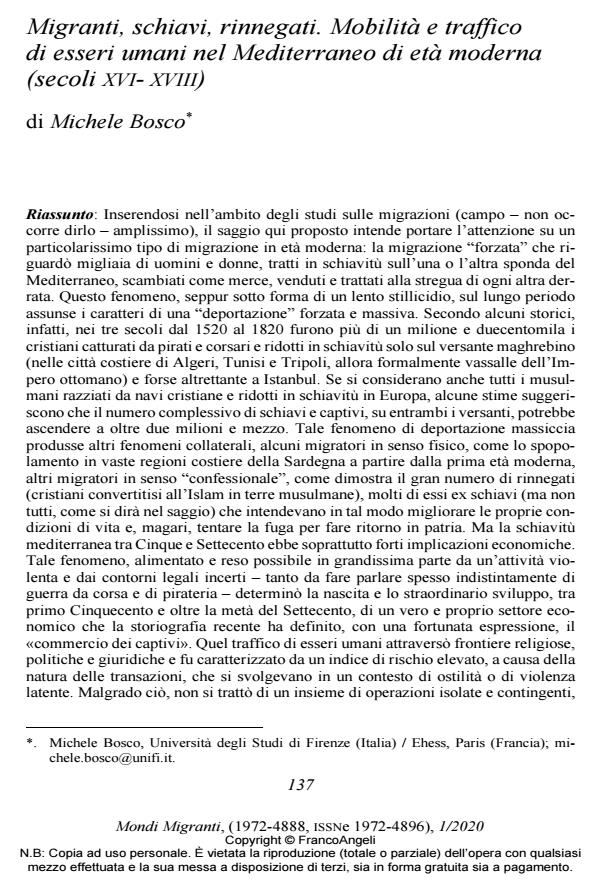Migrants, Slaves, Renegades. Mobility and Traffic of Human Beings across the Early-Modern Mediterranean (XVI- XVI centuries)
Journal title MONDI MIGRANTI
Author/s Michele Bosco
Publishing Year 2020 Issue 2020/1
Language Italian Pages 0 P. 137-162 File size 261 KB
DOI 10.3280/MM2020-001008
DOI is like a bar code for intellectual property: to have more infomation
click here
Below, you can see the article first page
If you want to buy this article in PDF format, you can do it, following the instructions to buy download credits

FrancoAngeli is member of Publishers International Linking Association, Inc (PILA), a not-for-profit association which run the CrossRef service enabling links to and from online scholarly content.
Within the riche field of migrations studies, the hereby proposed essay aims to fo-cus the attention on a very peculiar kind of migration in the early-modern age: the "forced" migration that attained thousands of people, men and women who were captured and kept as slaves on both Mediterranean shores, sold as merchandise and bought or exchanged just like any other good. Even if proceeding little by lit-tle, on the long period this phenomenon acquired the characters of a compelled and massive "deportation". According to some historians, along the three centuries from 1520 to 1820, more than 1 million and 200 thousands of Christians were captured and enslaved by Moorish pirates and corsairs and carried to the maritime cities of the Maghrebi shore (Algiers, Tunis and Tripoli, then formally vassals of the Ottoman Empire) and maybe to Istanbul as much. If we consider as well the high number of Muslims who were enslaved by Christians and sold to privates or kept as voguers on Europeans ships and galleys, the estimations of the global number of slaves and captives in the Mediterranean area could rise the two and half millions of people. Such phenomenon of a massive deportation produced others collateral ones: some of them, migrations in a physic sense " such as the depopulation of a wide regions of Sardinia starting from the early modern age " while others were "confessional" migrations, as it is demonstrated by the high number of renegades (Christians converted to Islam while staying in Muslims do-minions). Many of them were exslaves (although not all of them, as I explicate within the essay) who by this mean intended to get their living conditions betters, and if possible, trying to escape and return to their homeland. But the Mediterranean slavery between XVI and XVIII centuries also engendered deep economic im-plications. This phenomenon indeed, provoked the emergence and the extraordi-nary development of a truly economic branch, that the recent historiography has defined, with a successfully expression, the «economy of the ransom». The com-merce of the captives was really a traffic of human beings who crossed political, religious and juridical frontiers and became a regular and profitable commerce. The essay that hereby I propose intend to shed light on this phenomenon, consid-ering it at the same time as a cause and a consequence of one of the most im-portant and massive "forced" migration in the Mediterranean early modern history.
Keywords: Slavery; migrations; deportations; trafficking of human beings.
Michele Bosco, Migranti, schiavi, rinnegati. Mobilità e traffico di esseri umani nel Mediterraneo di età moderna (secoli XVI- XVIII) in "MONDI MIGRANTI" 1/2020, pp 137-162, DOI: 10.3280/MM2020-001008